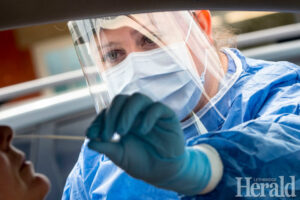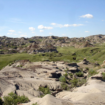COVID-19 dominated our lives as the story of the year for 2020
By Herald on January 1, 2021.
 Registered nurse Sheena Watson uses a nasopharyngeal swab as she takes a sample from a patient for COVID-19 testing earlier this year at the Lethbridge Health Unit. Herald file photo by Ian Martens
@IMartensHerald
Registered nurse Sheena Watson uses a nasopharyngeal swab as she takes a sample from a patient for COVID-19 testing earlier this year at the Lethbridge Health Unit. Herald file photo by Ian Martens
@IMartensHeraldLETHBRIDGE HERALD
It’s safe to say the year 2020 has been one for the ages.
While each year The Herald looks back on the local highlights and focuses on at least two events for its Newsmaker and News Story of the Year, this year it’s a no-brainer in combining both categories, due to the COVID-19 pandemic.
COVID-19 has had a profound effect on the lives of every person on the planet, including everyone in Lethbridge and southern Alberta.
The first front-page headline alluding to COVID-19 was in the Jan. 24 Herald: “Feds focus on self-reporting for virus.” The headline in the Jan. 29 Herald was “Alta. still free of coronavirus,” while two days later it was “Fourth case of coronavirus in Canada.”
Since then COVID-19 has had a date with the front page of not only our paper, but most papers around the world.
The first presumptive case of COVID-19 in Alberta was announced by Alberta Health on March 5 with the second case following a day later.
As cases continued to grow in the province, the University of Lethbridge and Lethbridge College were making preparations for online classes. On March 13, the Western Hockey League announced the cancellation of the remainder of the regular season, along with the South Zone basketball tournament and concerts at the Enmax Centre, followed by schools switching to online learning for the duration of the school year.
The City of Lethbridge opened its Emergency Co-ordination Centre on March 17 in preparation of its local response to COVID-19 and ordered all local public recreation and cultural facilities closed indefinitely.
“We want to support the intent of these closures and encourage everyone to stay home rather than visiting arenas, pools and other facilities,” said Lethbridge Mayor Chris Spearman at the time.
“We need to make sure people are not hoarding, that basic supplies are available to those in need and those less fortunate. Practise kindness and keep an eye out for the vulnerable ones in our lives.”
The following day, the City declared a State of Local Emergency in an effort to access additional resources and powers it would need as the COVID-19 outbreak intensified.
The first reported case in Lethbridge was on March 18.
The City announced it was temporarily moving the homeless shelter to the Fritz Sick gymnasium to allow for proper social distancing between individuals in the homeless community.
“Within our business continuity plans, the Fritz Sick Centre has always been our backup facility for the homeless shelter,” said interim city manager Jodi Meli.
The City was then forced to lay off 244 casual non-permanent and four permanent part-time employees. Those laid off included staff members employed at Lethbridge Transit as school bus drivers, and also those employed at the Lethbridge Public Library, the Enmax Centre, other closed City arenas and at facilities such as Fritz Sick Centre and the Galt Museum & Archives.
By March 20 there were five cases in the South zone including two in Lethbridge.
At the height of the first wave in southern Alberta, Lethbridge had 27 confirmed cases while the South Zone was second only to Calgary in total cases, mainly due to outbreaks at a meat packing plant in Brooks.
With cases in Lethbridge at a minimum in May, the City welcomed the province’s announcement that it intended to begin the process of relaunching Alberta’s economy. While there was a spirit of renewed optimism, said Spearman, that optimism must be tempered with continued caution to prevent a second potential wave of COVID-19.
Alberta relaunched its economy, with the exception of Calgary and Brooks, on May 15 with most amenities reopening in Lethbridge. However, City Director of Emergency Management Mark Rathwell noted everything could be closed again if there was a spike in COVID cases because people were not observing physical distancing, group gathering restrictions or proper hand sanitization.
As June began, the number of local cases took a dramatic downward turn with only two active cases on June 6. With only four local active cases on June 11, the province made the decision to take the next step in reopening its economy with everything from casinos, gyms, spas, movie theatres and swimming pools allowed by reopen.
The City was taking a cautious approach to Phase 2 reopening.
“We really want to manage the city’s expectations when we start to look at reopening here,” said Rathwell. “Even though we are really excited, and the community is really excited about that possibility, the reality is strong restrictions are still in place.”
The highest number of active cases in June totalled seven, resulting in the City lifting its State of Local Emergency on June 18 after 13 weeks.
The case count fell to three midway through the month before rebounding to nine near the end of the month.
COVID cases remained manageable to start July before growing from eight to 24 cases in just four days on July 17 as the province had its highest daily jump since May. A week later, it was up to 42 cases, prompting the City to require people to wear masks indoors at all City-owned facilities.
Many local groups did their best to provide a sense of normalcy over the summer including a drive-thru Whoop-Up Days food festival while New West Theatre presented “ Live! At The Drive-In” at Exhibition Park.
The Town of Raymond followed with a drive-in style performance from metal legends Metallica, one of only a few places in Canada to offer the concert.
One good-news story that emerged was real estate as sales in Lethbridge enjoyed a bumper month in July as people took advantage of lower interest rates, and “pent-up” sales finally came through after being delayed due to COVID-19 earlier in the year.
August started out promising with active cases ranging between 40 and 50 locally while provincially there was a downward trend with fewer than 100 reported each day over the first week.
Despite the stable number of cases, the City modified its mask mandate in August with masks required in public areas of all City-owned facilities.
The number of active cases continued in a positive downward trend as the month progressed and the city dropped to zero active cases on Aug. 24. Despite that, the City’s temporary mandatory mask bylaw came into effect with masks required to be worn in all public areas within the city.
Cases began to climb again as September began and students returned to school with 10 active cases on Sept. 1.With cases sitting at 16 on Sept. 8, a group of citizens held an anti-mask protest at city hall which delayed the start of city council’s meeting.
“There is no need for (a COVID-19 masking bylaw),” said protest organizer Lee Mein. “The numbers in the city were low, at zero when they actually posted it, and there are still no (higher) cases which validate having these things in place.”
With numbers remaining low through the middle of the month, more protests took place decrying loss of “freedoms.”
The city was down to one active case on Sept. 26, the last time it would be that low for the remainder of the year.
After starting October with four cases, the surge began locally and provincially. The local total doubled from four to eight on Oct. 6 as cases were confirmed at Lethbridge Family Services. The next day, there were 29 active cases, increasing to 38 on Oct. 8 as AHS confirmed a 23-case outbreak with a local church community and three at a local daycare.
The outbreaks continued following Thanksgiving weekend with the total ballooning from 49 local cases to 101. There were eight cases reported at Cavendish Farms potato processing plant and seven cases between the local school divisions.
Twenty-two new cases followed the next day with 10 each at Cavendish and Meridian Manufacturing increasing the overall total to 112.
“The health and safety of our employees is our number-one priority,” said Lee Gleim, director of operations for Cavendish Farms Lethbridge. “Based on a planned maintenance shutdown, manufacturing operations ceased Oct. 9 at our Lethbridge facility. Operations will restart on Oct. 19.”
The highest daily total for the month was 161 on Oct. 24.
Lethbridge went from 164 to 201 cases over three days in early November with the main driver being a private gathering which resulted in 28 cases. There were also three reported cases among health-care workers at Chinook Regional Hospital.
While numbers continued to hover just below the 200 mark midway through the month, there was finally some good news with Canada set to receive 4 million doses of the Pfizer vaccine from January to March with almost 700,000 expected in Alberta.
However, cases continued to surge in November resulting in a provincial ban on home gatherings. Lethbridge reached 195 cases on Nov. 26 and was up to 206 cases on Dec. 1, prompting the City to extend the mask bylaw to Feb. 23.
“We need to take personal responsibility,” said Spearman. “There are numerous reports of people not adhering to health guidelines.”
Four days later, Lethbridge was at 250 cases as the province topped 1,800 for the day, prompting the province to initiate tougher measures. That included a strict economic lockdown and a ban on all outdoor social gatherings coming into effect for four weeks starting Dec. 13.
“If stronger action is not taken now, we know that hundreds, potentially thousands, of Albertans will die,” said Premier Jason Kenney. “We cannot let that happen. We will not let that happen.”
The next day, Health Canada approved the Pfizer vaccine with the first vaccinations for front-line health-care workers given on Dec. 15.
The Lethbridge Police Chief Shahin Mehdizadeh said the time for education on the masking issue is over as the Lethbridge Police Service moved toward a greater enforcement phase of the City’s temporary face-covering bylaw in conjunction with new public health measures announced by the province.
Alberta began administering COVID vaccinations to front-line health-care workers in the middle of the month and the provincial lockdown appeared to be working in the South Zone and Lethbridge with case totals falling below 200, hitting 155 on Dec. 22.
On Dec. 23, Health Canada approved Moderna’s COVID-19 vaccine and it was announced the country will receive more doses in January of the Pfizer vaccine than previously expected with a total of 1.2 million combined doses expected to be delivered by Jan. 31.
The number of cases continues to trend in the right direction as the year comes to an end with Lethbridge at 103 active cases according to the latest count from Alberta Health.
-1




